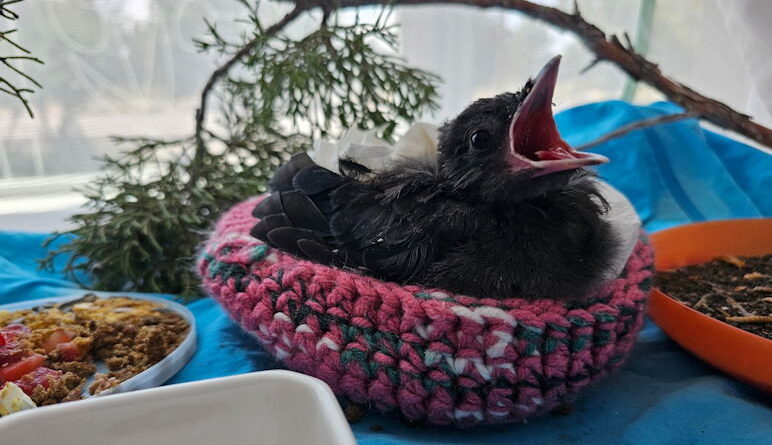Think Wild looks at how wildfires, smoke are affecting Central Oregon’s wildlife, offers ways you can help – KTVZ
BEND, Ore. (KTVZ) — Even though summer is coming to an end, wildfire season is once again rearing its head, as more wildfires have broken out across the state, causing displacement, low winds, and concerns about life and property.
At Think Wild Center, a wildlife hospital and conservation center in Bend, nearby fires — including the Little Lava Fire near Mt. The Bachelor, Firestone and Flat Top Fires — and the poor air quality associated with them — have rekindled questions about how wildfires affect Oregon’s wildlife. And how can we humans help?
Fortunately, Oregon’s native species have adapted to wildfires, but that doesn’t mean many won’t suffer or lose their lives. Wildfires cause immediate habitat loss and potential hazards, and change the landscape and ecosystem for years to come. Some species that depend on mature forests – tree-nesting owls, for example – may experience population declines while those that live in younger forests, such as songbirds and burrowing mammals, may increase.
In the short term, with the intensity and size of the current wildfires, wildlife may enter urban areas and exhibit unusual behavior as they flee the smoke and flames within weeks. the following. They will also be searching for food sources, which will be greatly reduced immediately after the fire.
“Toward the end of the season, fortunately there are fewer pups and very young wildlife at risk from wildfires. By mid-September, most of the first year’s wildlife is gone. have escaped or are able to escape and seek shelter,” said Sally Compton, executive director of Think Wild. “That said, fires will reduce available habitat and habitat, making resources scarce and increasing competition. This can be especially difficult for wildlife that are learning to hunt or hunt. graze, as well as those that need to raise a lot of money before winter.”
Heat, wildfires, and low winds can have similar effects on the wildlife we encounter. “During extreme heat or poor air quality, we have animals that will show symptoms related to dehydration, hypothermia, general confusion, and respiratory problems,” said Think. Wild Director of Wildlife Rehabilitation Pauline Hice.
He advises people to “watch out for wild animals that pass through your area fleeing the fire, looking for shelter and looking for food and water.”. Do not be afraid or approach these animals but watch from a distance. If you notice wild animals exhibiting unusual behavior or are concerned about danger, please contact your local wildlife center.”
Although wildlife hospitals across Oregon have not been overwhelmed by direct wildfire calls, we expect cases to increase as environmental changes take effect and as people return to affected areas and have and the opportunity to meet wildlife in need.
Here you go Other ways you can help wildlife and your local hospitals:
- Do not leave food outside or feed wildlife. If you have a bird feeder, clean it often. You can keep water away from your home as long as you change it regularly.
- Make sure that water features on your property, such as irrigation ponds, provide an escape route for wildlife to climb. Rocks, ropes and trees are the additions that help prevent wildlife from drowning.
- Keep dogs and cats indoors as much as possible during dangerous winds. This will protect them and prevent cat and dog related accidents to small animals and wild animals that may be traveling or seeking refuge.
- Do not approach wild animals. Call your local hospital if you find injured or orphaned wildlife or if you see wildlife behaving strangely and are not sure what to do next.
- If you find an animal that has been burned and is waiting to be seen at a wildlife hospital or vet, do not feed it. Cover the animal loosely with 100% cotton and place it in a well-ventilated box in a dark and quiet place.
- Watch your water usage. Try to reduce water use, especially during drought, hot, dry summer months and wildfire season.
- Be aware of fire restrictions, especially when traveling elsewhere. Stay educated about potential fire hazards – small, controlled fires can quickly become catastrophic.
- Your local hospital could use a lot of donations and resources. Most wildlife hospitals (including Think Wild) do not receive much government funding, and rely on individual and monetary donations.
This list is not exhaustive, but we hope it will help you. If you have questions, the Think Wild wildlife hotline, (541) 241-8680, is available seven days a week from 8 AM to 5 PM. Think Wild is a 501(c)(3) nonprofit organization, and tax-deductible donations can be made at www.thinkwildco.org/donate or mailed to PO Box 5093 Bend, OR 97708.
###
About Think Wild
Think Wild is a 501(c)3 non-profit organization located in Bend, Oregon. Our mission is to encourage the High Desert community to care for and protect wildlife through rescue and rehabilitation, service and education, and conservation. We provide veterinary treatment and care at a wildlife hospital, staffed by professional wildlife rehabilitation professionals, animal husbandry volunteers, and our own veterinary staff. Wildlife conflicts or accidents can be reported to our Wildlife Hotline at (541) 241-8680, manned seven days a week from 8 AM to 5 PM. Visit us online at thinkwildco.org, or on Instagram or Facebook @thinkwildco.
#Wild #wildfires #smoke #affecting #Central #Oregons #wildlife #offers #ways #KTVZ
